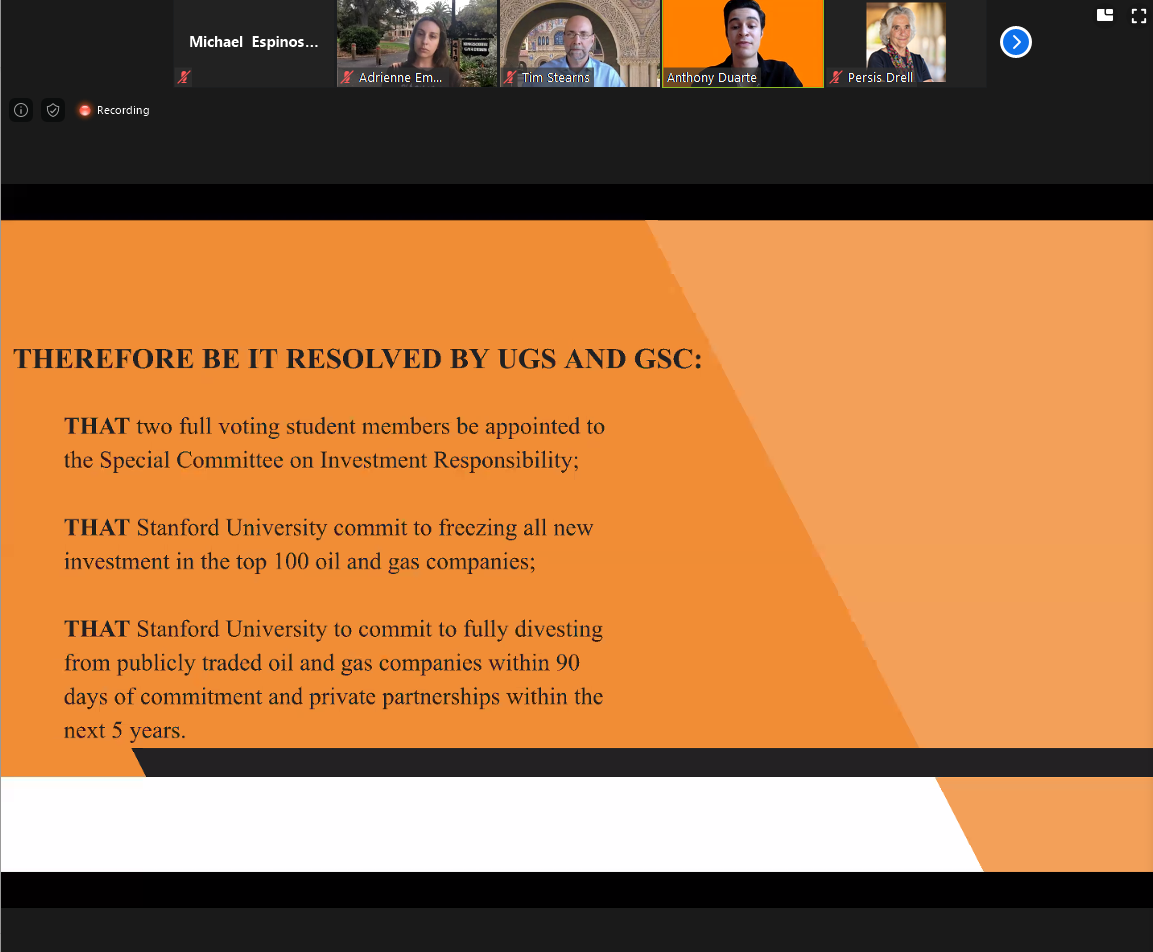By a margin of 11 to 28, with six abstentions, the Faculty Senate in a long-awaited vote rejected a resolution calling for Stanford to commit to divestment from oil and natural gas companies, leaving students frustrated with the vote and the meeting’s proceedings. A final decision on divestment will be made by the Board of Trustees in June.
Former Undergraduate Senator Anthony Duarte ’22 presented a resolution calling on the University to commit to freezing investment in the top 100 oil and gas companies and commit “to fully divesting from publicly traded oil and gas companies within 90 days of commitment and private partnerships within the next 5 years.” The resolution had already been passed by both the Undergraduate Senate and Graduate Student Council.
Discussion at the meeting centered around a 2018 decision by Stanford Management Company to divest from companies whose behaviors are deemed by the Board of Trustees as “abhorrent and ethically unjustifiable.”
“Given our scientific understanding of how fossil fuel corporations endanger human lives across the world, investment in these companies is ethically unjustifiable,” Duarte said.
Paul Brest, professor emeritus at Stanford Law School, cautioned against labeling the entire industry as “ethically unjustifiable” since individuals and institutions depend on fossil fuels to provide everyday services like heating, air conditioning and transportation. But Brest conceded that some companies do conduct “ethically unjustifiable” activities and divestment from those companies should be determined on a case-by-case basis.
“There’s little doubt that some oil and gas companies have engaged in human rights violations, environmental damages, misrepresentation of risk, political lobbying to forestall renewable energy,” Brest said. “Some of their behaviors may well be abhorrent and ethically unjustifiable as prohibited by the 2018 statement on investment responsibility. These deserve and require individual determinations, but not an attribution of collective guilt.”
But history professor Mikael Wolfe argued that companies’ membership in trade associations that spread misinformation on climate science was a reason to divest from oil and gas companies.
“All hundred oil and gas companies listed here are part of the American Petroleum Institute, which actively lobbies on their behalf against climate legislation and funds groups to sow doubt in the science,” he said. “What I’m more concerned about is far more valuable to Stanford, namely its reputation and legacy.”
Wolfe described divestment as a social movement that Stanford should take part in, as peer institutions including Cornell and the University of California system announce or finish implementing divestment from fossil fuels.
Geophysics professor Dustin Schroeder was also concerned with the University’s reputation, but noted the close ties Stanford has to the fossil fuel industry.
“I know that funding from fossil fuels supports a lot of environmental and alternative energy research on campus,” he said.
Schroeder weighted this research — which he described as being conducted in areas such as climate dynamics, renewable energy and sustainable groundwater management — against divestment.
“Will us, supporting this jeopardize the support for our students in their capacity to research this, in our capacity to undertake the super important [greenhouse gas] minimizing climate and energy research we’re doing?” he asked.
Both Schroeder and Stephen Graham, dean of the School of Earth, Energy and Environmental Sciences, said that the fossil fuel industry has supported the research of more than 1,000 students. Graham added that the University has maintained ties to the industry for several decades.
“So my concern is that a vote in favor of the resolution today may serve to undermine those partnerships, so successfully cultivated over the years, and result in a shift in the funding that is so critical to our mission toward a clean energy system from Stanford, away from Stanford and toward other institutions to happen,” Graham said. “It would be a tragic loss to many Stanford students, faculty departments and institutes, and a significant setback to research that is needed now more than ever.”
Students from environmental groups expressed frustration with the vote and the proceedings.
“We’re angered by the Faculty Senate’s refusal to listen to student voices,” wrote activist group Fossil Free Stanford in a statement to The Daily. “ASSU reps were given two chances to speak, with no chance to answer the questions that fed doubt to the senate. It became apparent that the majority of the current senate has little regard for a sustained, resounding call for divestment from Stanford students.”
Chris Tan ’21, co-director of Students for Sustainable Stanford, said that discussion at the meeting did not adequately take into account environmental justice and the lived realities of people in marginalized communities.
“The discussion highlighted the lack of representation from impacted communities, and the silence on the disproportionate impacts of climate change on poor people of color globally,” he said. “Furthermore, it was a refusal to acknowledge how the fossil fuel industry is predicated on the violent displacement and erasure of Indigenous peoples as well as the siting of polluting facilities in primarily Black and Brown communities.”
Nancy Chang ’20, co-leader of Students for Environmental and Racial Justice, expressed disappointment that the resolution failed.
“It wasn’t just about the decision on whether to support divestment; the student involvement in the Special Commitment on Investment Responsibility also got shot down with it — there should have been a motion to divide the question,” Chang said. “Student engagement is crucial to long-term decision making and making sure the process is open and transparent.”
Contact Michael Espinosa at mesp2021 ‘at’ stanford.edu.
